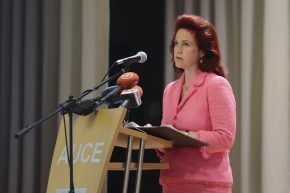 VideosGallery
VideosGallery
Local governments that are well-informed about the social problems of a specific area are irreplaceable partners for the national government, and without their help the state cannot fulfil all of its tasks; therefore, development of effective dialogue with local governments is a matter of honour and prestige of national policy. This was expressed by Solvita Āboltiņa, Speaker of the Saeima, on Friday, 9 August, in her address to the 24th Congress of the Latvian Association of Local and Regional Governments.
The Speaker of the Saeima emphasised that dialogue and trust are keywords that should describe the relationship between national policy developers and local governments. Therefore, in her address to the Congress, Speaker Āboltiņa reminded the audience that the relationship between national and local governments is not one of employer – employee: “First and foremost it is a partnership with one common goal – to improve the quality of life of our people. Good governance demands that each issue be solved at the appropriate level where it is most convenient to do so.”
Speaker Āboltiņa also expressed her conviction that debates about the future of the country must not be a one-sided process and that local governments should participate more actively in solving issues of national importance. Speaker Āboltiņa expressed gratification that the Congress plans to adopt several resolutions on the internal procedures of local governments, as well as on medium-term national policy directly concerning local governments.
“Today, when statistics are beginning to show stable improvement of the economic situation, it is especially important to think about ways to reduce inequality and poverty in our country, and local governments play an important role here,” said Speaker Āboltiņa when talking about the initiative to increase the minimum salary to LVL 225 (EUR 320) as of 2014. “We are also planning to introduce a differentiated non-taxable minimum income – for salaries that do not exceed the minimum salary, the non-taxable minimum will be 84 lats, whereas for larger salaries it will gradually decrease, and for salaries exceeding LVL 400, the non-taxable minimum will remain at the current level of LVL 45. We are also planning to increase tax reductions for dependents up to LVL 98 per month,” said the Speaker of the Saeima, emphasising that these steps will significantly increase income for families with children.
“The biggest benefits from this policy to reduce inequality will be reaped by those Latvians who are living on the edge of poverty and who are most in need,” Speaker Āboltiņa stressed. “That means more money in the wallets of Latvia’s people who can then use it as they see fit – for consumption of for savings. That means greater support for families with children – confidence in future stability in Latvia. That brings us a step closer to a Latvia where everyone feels accepted and welcome, where children are born and people feel confident about their own and their family’s future,” said the Speaker of the Saeima.
In conclusion, Speaker Āboltiņa stressed that the national government and the Saeima are partners of local governments: “A resource that is often lacking in this relationship and is in short supply throughout Latvia is trust. But trust is not forged through declarations and eloquent speeches; it is created by cooperation, understanding and keeping of promises. Therefore, we must work together responsibly and productively.”
Saeima Press Service







